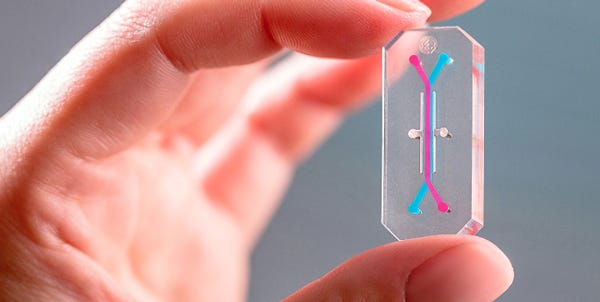April 22, 2016
|
|
A Harvard-born startup is replicating human organs on computer chips to help researchers predict human responses better than cell-culture or animal-based testing can.
Nancy Crotti
Emulate, based in Boston, just raised $28 Million to commercialize its organs-on-chips technology into a lab-ready system aimed at improving drug development and consumer product design. The automated system includes organ chips, instrumentation, and software apps.
The 35-person company, spun off in 2014 from Harvard University's Wyss Institute for Biologically Inspired Engineering, says the plug-and-play system will "allow end users to easily conduct experiments within their own labs, without requiring specialized expertise."
Emulate can already produce chips to mimic the human lung, liver, intestine, and skin. It wants to add the kidney, heart, and brain to its product mix, and is working with the Michael J. Fox Foundation to study Parkinson's disease drug safety.
Emulate places living human cells in microengineered environments, each the size of a USB plug-in. Each chip contains tiny hollow channels lined by tens of thousands of living human cells and tissues cultured under continuous fluid flow and mechanical forces, such as cyclic breathing and peristalsis. This activity is designed to recreate the microenvironment experienced by cells within the human body.
Here's how Wired UK described lung-on-a-chip in a recent story: "Lung cells, for instance, are contained in a channel where air is passed over them and liquid-carrying nutrients sweep by via a porous membrane below. A pump attached to the chip simulates the way these cells are pushed, pulled and squeezed in the body when we breathe."
A video on Emulate's website demonstrates how the company assembles the chips.
The company has some big-time partners. It is working with Merck to provide the use of its organ-chip technology
to enable predictive modeling of inflammatory processes in the human lung and the gastrointestinal system, Emulate said on its website. The study was written up in Nature Methods.
Emulate is also partnering with Janssen Pharmaceutical, a subsidiary of Johnson & Johnson, on the candidate design and selection portions of three Janssen R&D programs.
A collaboration with Cedars Sinai Medical Center's Board of Governors Regenerative Medicine Institute could provide a system to improve R&D for drug development for neurodegenerative diseases.
Emulate chief scientific officer Geraldine Hamilton wouldn't reveal to Wired when the chips would be available commercially, only allowing that launch would occur "in the next few years."
Check out more medtech-related electronics advances>>
Learn more about cutting-edge medical devices at MD&M East, June 14-15, 2016 in New York City. |
Nancy Crotti is a contributor to Qmed and MPMN.
Like what you're reading? Subscribe to our daily e-newsletter.
About the Author(s)
You May Also Like





